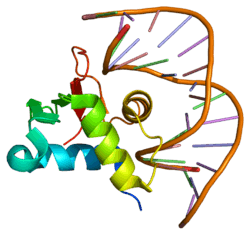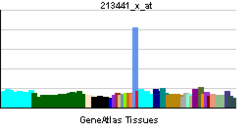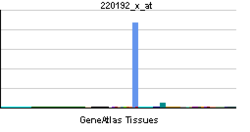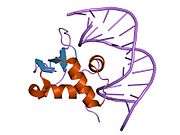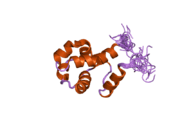SPDEF
SAM pointed domain-containing Ets transcription factor is a protein that in humans is encoded by the SPDEF gene.[1][2][3]
PDEF is an ETS transcription factor expressed in prostate epithelial cells. It acts as an androgen-independent transactivator of PSA (MIM 176820) expression.[supplied by OMIM][3]
Interactions
SPDEF has been shown to interact with NKX3-1.[4]
The Protein Kinase CK2 has been shown to control the stability of PDEF. [5]
References
- ↑ Oettgen P, Finger E, Sun Z, Akbarali Y, Thamrongsak U, Boltax J, Grall F, Dube A, Weiss A, Brown L, Quinn G, Kas K, Endress G, Kunsch C, Libermann TA (February 2000). "PDEF, a novel prostate epithelium-specific ets transcription factor, interacts with the androgen receptor and activates prostate-specific antigen gene expression". J Biol Chem 275 (2): 1216–25. doi:10.1074/jbc.275.2.1216. PMID 10625666.
- ↑ Johannessen JV, Finseth I (July 1983). "Electron micrographs in five minutes". Ultrastruct Pathol 4 (1): 97–100. doi:10.3109/01913128309140576. PMID 6857767.
- 1 2 "Entrez Gene: SPDEF SAM pointed domain containing ets transcription factor".
- ↑ Chen, Hui; Nandi Asit K; Li Xiang; Bieberich Charles J (January 2002). "NKX-3.1 interacts with prostate-derived Ets factor and regulates the activity of the PSA promoter". Cancer Res. (United States) 62 (2): 338–40. ISSN 0008-5472. PMID 11809674.
- ↑ Chisholm, Christine; Padmanabhan Achuth; Guan Bin; Li Xiang; Kalra Simran; Bieberich Charles J (2010). "Protein Kinase CK2 regulates the stability of prostate derived Ets factor". The Open Cancer Journal (Bentham Science) 3: 109–115. doi:10.2174/1874079001003010109.http://www.benthamscience.com/open/tocj/articles/V003/SI0022TOCJ/109TOCJ.pdf
Further reading
- Lance V (1976). "Studies on the annual reproductive cycle of the female cobra, Naja naja. Seasonal variation in plasma inorganic ions.". Comparative biochemistry and physiology. A, Comparative physiology 53 (3): 285–9. doi:10.1016/S0300-9629(76)80037-0. PMID 2437.
- Yamada N, Tamai Y, Miyamoto H, Nozaki M (2000). "Cloning and expression of the mouse Pse gene encoding a novel Ets family member.". Gene 241 (2): 267–74. doi:10.1016/S0378-1119(99)00484-9. PMID 10675039.
- Chen H, Nandi AK, Li X, Bieberich CJ (2002). "NKX-3.1 interacts with prostate-derived Ets factor and regulates the activity of the PSA promoter.". Cancer Res. 62 (2): 338–40. PMID 11809674.
- Strausberg RL, Feingold EA, Grouse LH, et al. (2003). "Generation and initial analysis of more than 15,000 full-length human and mouse cDNA sequences.". Proc. Natl. Acad. Sci. U.S.A. 99 (26): 16899–903. doi:10.1073/pnas.242603899. PMC 139241. PMID 12477932.
- Thompson HG, Harris JW, Wold BJ, et al. (2003). "p62 overexpression in breast tumors and regulation by prostate-derived Ets factor in breast cancer cells.". Oncogene 22 (15): 2322–33. doi:10.1038/sj.onc.1206325. PMID 12700667.
- Feldman RJ, Sementchenko VI, Gayed M, et al. (2003). "Pdef expression in human breast cancer is correlated with invasive potential and altered gene expression.". Cancer Res. 63 (15): 4626–31. PMID 12907642.
- Mungall AJ, Palmer SA, Sims SK, et al. (2003). "The DNA sequence and analysis of human chromosome 6.". Nature 425 (6960): 805–11. doi:10.1038/nature02055. PMID 14574404.
- Ghadersohi A, Odunsi K, Lele S, et al. (2004). "Prostate derived Ets transcription factor shows better tumor-association than other cancer-associated molecules.". Oncol. Rep. 11 (2): 453–8. doi:10.3892/or.11.2.453. PMID 14719083.
- Gerhard DS, Wagner L, Feingold EA, et al. (2004). "The status, quality, and expansion of the NIH full-length cDNA project: the Mammalian Gene Collection (MGC).". Genome Res. 14 (10B): 2121–7. doi:10.1101/gr.2596504. PMC 528928. PMID 15489334.
- Chen H, Bieberich CJ (2005). "Structural and functional analysis of domains mediating interaction between NKX-3.1 and PDEF.". J. Cell. Biochem. 94 (1): 168–77. doi:10.1002/jcb.20297. PMID 15523673.
- Wang Y, Feng L, Said M, et al. (2005). "Analysis of the 2.0 A crystal structure of the protein-DNA complex of the human PDEF Ets domain bound to the prostate specific antigen regulatory site.". Biochemistry 44 (19): 7095–106. doi:10.1021/bi047352t. PMID 15882048.
- Fowler M, Borazanci E, McGhee L, et al. (2006). "RUNX1 (AML-1) and RUNX2 (AML-3) cooperate with prostate-derived Ets factor to activate transcription from the PSA upstream regulatory region.". J. Cell. Biochem. 97 (1): 1–17. doi:10.1002/jcb.20664. PMID 16237704.
- Gunawardane RN, Sgroi DC, Wrobel CN, et al. (2006). "Novel role for PDEF in epithelial cell migration and invasion.". Cancer Res. 65 (24): 11572–80. doi:10.1158/0008-5472.CAN-05-1196. PMC 2919290. PMID 16357167.
- Rodabaugh KJ, Mhawech-Fauceglia P, Groth J, et al. (2007). "Prostate-derived Ets factor is overexpressed in serous epithelial ovarian tumors.". Int. J. Gynecol. Pathol. 26 (1): 10–5. doi:10.1097/01.pgp.0000225386.41244.bd. PMID 17197890.
- Park KS, Korfhagen TR, Bruno MD, et al. (2007). "SPDEF regulates goblet cell hyperplasia in the airway epithelium.". J. Clin. Invest. 117 (4): 978–88. doi:10.1172/JCI29176. PMC 1810569. PMID 17347682.
| |||||||||||
This article is issued from Wikipedia - version of the Wednesday, September 02, 2015. The text is available under the Creative Commons Attribution/Share Alike but additional terms may apply for the media files.
